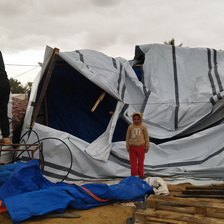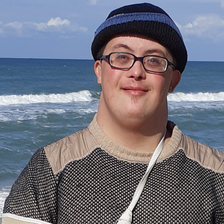The Electronic Intifada 21 February 2025

Basel Al-Saqqa with Omar.
Omar was missing.
Rescue crews searched for hours, thinking the body of the two-month-old baby boy was buried under the rubble of his father’s house in the al-Sika area in Khan Younis, which had just been hit in an air strike.
Their luck was out. They told his surviving family they believed he had not survived.
But then a neighbor heard groaning and crying from an olive tree nearby. He looked up. There was little Omar hanging from a branch.
It was 7 December 2023. A “tough day,” according to journalist, Basel Al-Saqqa, Omar’s uncle.
Today, the boy lives with his grandmother, Itaf, and Basel in a tent in the al-Mawasi area of Khan Yunis. Omar’s parents, older brother and seven other people were killed in the Israeli attack.
But that December day, the family was trying to comprehend the shocking news.
“We lived hours of anxiety after the neighbors informed us that my brother’s house had been bombed,” Basel told The Electronic Intifada in February.
“After the civil defense teams left and the sound of their digging through rubble stopped, relative calm returned to the area … and then the shock occurred”.
The neighbor who spotted the boy contacted emergency medical workers. They took Omar to the Nasser Medical Complex. Miraculously, doctors determined that he was fine and free of any injuries.
No one could believe it, but Basel and his mother, who had been displaced just two days before the attack from their home in Hamad City, immediately took the boy into their care.
Raising Omar
According to the UN, some 17,000 children have been orphaned in Israel’s genocidal aggression, losing either one or both of their parents.
Many of these have been left unaccompanied, with no known surviving relatives to care for them
Omar has been relatively fortunate in that respect, though Basel confessed that raising a baby with his mother was not easy at times.
“We try to provide the boy with a sense of security,” Basel said. “I treat him like my own son.”
But for all they play with Omar and provide for his needs, neither are under any illusion that they can give the boy the same tenderness as his parents.
“Sometimes, when he cries at night, I feel helpless,” Itaf said. “I know he’s looking for his mother and he will never find her.”
Life in the camp is also harsh. The rain and cold in winter make survival even more difficult, especially with a small child. There is little by way of comfort, privacy or security, and clean water and electricity are scarce.
Itaf feeds Omar and changes his clothes. Occasionally, neighbors and volunteers offer some assistance with food donations or by sharing in the daily duties of cleaning and watching over Omar.
But the future is uncertain. Basel says he has no idea how he will secure a dignified life for his nephew. The loss of the family home in Hamad City and the massive destruction all over Gaza have made the prospect of returning to any sort of normal life unlikely for the foreseeable future.
And the family is still mourning their loved ones from that fateul December day.
Basel said he feels a “part of me left with him,” as he continues to struggle with the loss of his brother, also his closest friend.
Itaf carries indescribable grief, having lost a son, grandson and daughter-in-law in a single moment. She now bears the responsibility of helping raise her only surviving grandson.
“The days have lost their meaning,” she told The Electronic Intifada. “Everything reminds me of them. When I look at Omar, I see my son in his eyes, and that brings the pain rushing back.”
Shaimaa Eid is a journalist based in Gaza.





